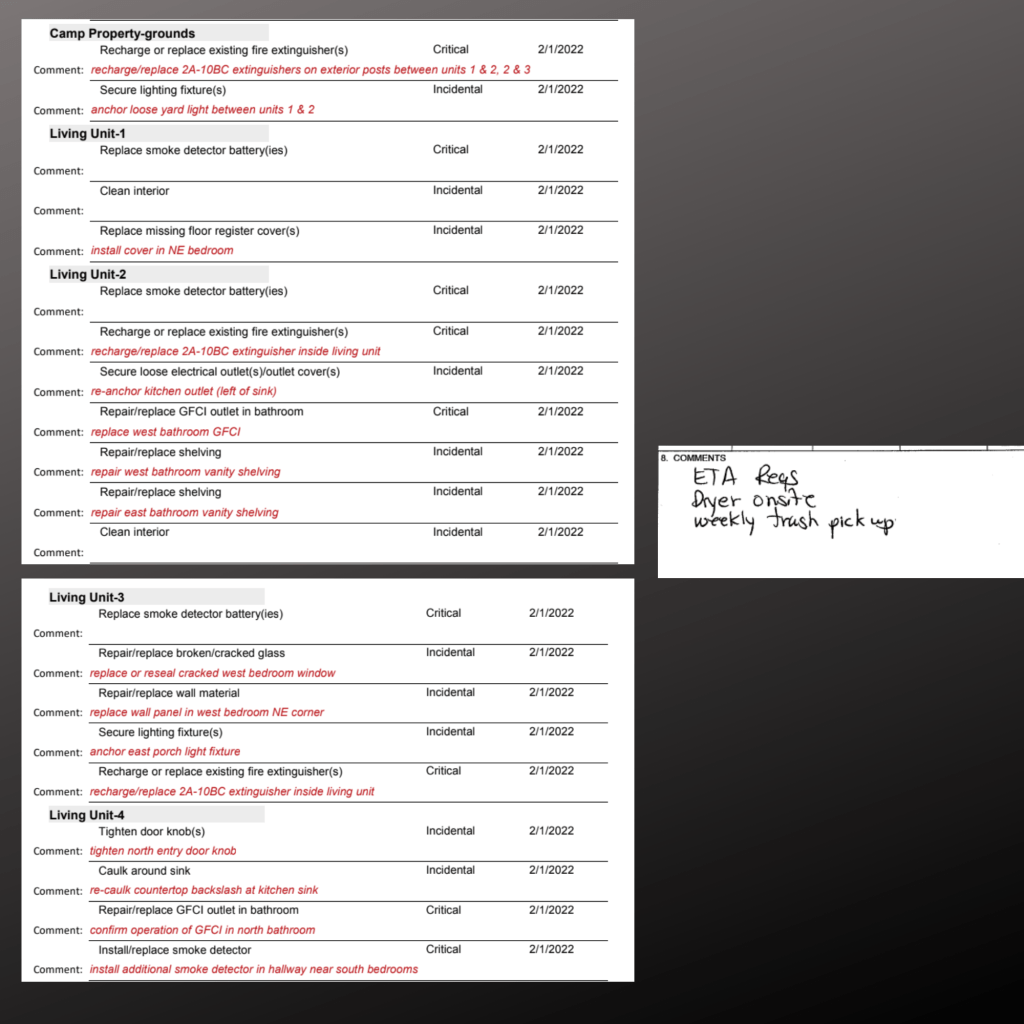Connecting state and local government leaders
The federal government requires all states to inspect housing for temporary agriculture workers annually, but only some states inspect known migrant labor camps.
This project was funded by the Pulitzer Center on Crisis Reporting.
No smoke detector. No fire extinguisher. No emergency exit.
In October 2022, an inspector ticked off problems in the white, single-story house in a rural town in western Nebraska. Three farmworkers — the low-paid laborers that power the agriculture industry — were scheduled to arrive in town soon. They would corral cattle in the cold.
Their employer intended to keep them in the white house, but it was unlivable, according to the inspector. Along with no fire prevention measures in place, mold flowered in the basement, and water pooled in the drains.
State records are unclear whether the employer addressed the inspector’s findings.
But, across the country, when farmworkers arrive at employer-provided housing, they often face similar problems, according to Investigate Midwest’s review of more than 6,600 inspections of H-2A housing and migrant labor camps from 19 states.
The analysis found:
Faulty fire prevention. Inspectors in nine of the 19 states noted dead smoke detectors, empty fire extinguishers and blocked or nonexistent emergency exits. Some inspectors asked employers to provide emergency exit signs in English and Spanish, the language most farmworkers are fluent in. In all, inspectors identified more than 300 problems related to fire prevention in just 2022, according to Investigate Midwest’s analysis.
In one incident in 2021, two men perished in a fire in employer-provided housing in North Carolina. The cause of the fire is unclear. The state inspected the trailer before workers arrived, but the inspection offered no details on the condition of its smoke alarms. A survivor of the fire told Investigate Midwest he could not remember alarms sounding. The employer could not confirm whether the alarms worked, according to a fire investigation report.
Leaks contributing to mold or mildew. Inspectors in eight states identified leaky fridges or toilets, or standing puddles of water. In a New York house, water seeped from the upstairs kitchen into a bedroom. Mold grew in the bathroom. Some 200 inspections identified leaks or mold or mildew. Mold can lead to itchy eyes or skin and breathing issues, according to the Centers for Disease Control and Prevention.
Missing first aid kits. In nine states, inspectors recorded either missing first aid kits or kits that had insufficient supplies. Providing a first aid kit to H-2A workers is a federal requirement, yet inspectors had to remind employers of this about 100 times in 2022, according to the records. Agriculture work often exposes workers to danger, such as excessive heat and pesticides that can irritate the eyes and skin.
The figures above represent a small sample of the total number of inspections in a year. In some instances, the issues were fixed during follow-up inspections or on the spot, as some inspection documents showed.
Problems can persist, though.
For example, in 2021 in southern Michigan, an inspector visited a grouping of houses along a rural highway. He noted an empty fire extinguisher, no batteries in the smoke detectors and a broken GFCI outlet.
The inspector told the employer the “critical” violations needed to be rectified before workers arrived. A follow-up inspection, months later, would confirm the fixes. But in the previous two years, inspectors had identified similar issues, records show.
In all, only six inspection records in the 19 states explicitly stated dwellings were in “good condition.”
Many people working in the American agriculture industry have the potential to face substandard housing. There are roughly 1 million farmworkers in the U.S., according to federal data. About a third of them arrive in the U.S. on H-2A, or temporary agriculture labor, visas.
They detassel the corn that allows major seed and pesticide companies, such as Bayer and Corteva, to produce more efficient seed varieties to market to farmers. They pick and package the vegetables that consumers purchase conveniently at grocery stores. And, more commonly now, they build massive barns for the livestock industry.
The federal government requires all states to inspect H-2A housing annually, though only some states inspect known migrant labor camps. Understanding the quality of farmworker housing proved difficult.
Hover or click on the dots in the map on the right to see more detailed information, including the violations inspectors found. This is an ongoing project, and this map will be updated as more records are analyzed. The amount of information collected by each state varies. The names of companies and the content of the comments are as described by each state agency; they have not been edited and may contain spelling or other errors.
Starting two years ago, Investigate Midwest attempted to obtain farmworker housing inspections from every state but was stymied.
The U.S. Department of Labor, which oversees the H-2A program, said it could not provide detailed inspection information. Several states just denied requests for inspections. Some states said inspections were only maintained on paper, leading to requests for hefty copying fees.
When states did supply their records, sometimes critical information, such as the employer’s name and the inspector’s comments, was redacted — making it difficult to link repeated issues to specific companies. (Investigate Midwest successfully challenged the redactions in Illinois.)
Chronic Housing Complaints
Farmworkers have complained of substandard housing for decades. In 1960, television viewers saw farmworkers living in horrifying conditions on the CBS broadcast, “Harvest of Shame,” which was produced by Edward R. Murrow. Since then, advocacy groups, government agencies and news organizations have documented consistently unsafe housing.
In 2019 and 2020, the organization Centro de los Derechos del Migrante, Inc., or CDM, spent months interviewing 100 workers in Mexico. They had been hired to work in the U.S. through the H-2A program over the past four years. Nearly half reported “overcrowded and/or unsanitary” conditions, according to the organization’s report.
One worker told the organization his employer-provided housing was infested with rats and had a broken refrigerator, so food quickly spoiled. Another worker relayed living in an “iron chicken coop.”
At minimum, all states must inspect employer-provided H-2A housing before the dwelling is occupied. Only some states inspect after workers arrive. In its report, CDM said inspections while workers are present is “essential” — “housing that appears to be adequate prior to occupation may quickly become overcrowded, unsanitary, and unsafe once occupied.”
That was the situation in 2018 in Missouri, which only inspects H-2A housing prior to occupancy. A Florida labor contractor had bought two houses for workers who would pick watermelons in the state’s Bootheel that summer. When the inspector visited, she approved both houses.
Her only notes: “Large trash container for weekly pickup. 3 smoke alarms. Will take workers to local laundry mat (sic) once a week.”
Soon, though, federal investigators descended on the labor contractor after two workers complained about their treatment.
When investigators toured the houses — two months after the state inspection — they found “unsafe, deteriorating and unsanitary” conditions. Trash had piled up inside and out. A toilet leaked so much water pooled under the floor. Milk was stored in the freezer because the fridge failed.
After the federal investigation became public, Missouri officials with the state’s department of economic development told Investigate Midwest an inspection report is a “snapshot in time.”
Failing System to Inspect Houses
Half a century ago, the government created a system to address poor farmworker housing, among other indignities. But the system has struggled to perform its basic duties, Investigate Midwest has reported.
Inspecting houses often means spending hours driving to rural areas, and developing relationships with farmworkers who could blow the whistle on poor housing takes time.
“You can’t just put somebody in that seat,” a former inspector told Investigate Midwest.
But staff turnover has plagued the program. One of its basic tenets is outreach to farmworkers, which many state inspectors fail to perform on a yearly basis, according to internal program reports.
Federal Data Lacking
The U.S. Department of Labor maintains detailed — and readily available — records on the H-2A visa program.
On its website, the labor department has collated how many hours will be worked on each day of the week, the education level employers require for workers, and even the middle initials of the lawyers who fill out the H-2A paperwork for employers.
Little is available on housing quality.
The federal data shows where workers will live, how many people will stay there with them and whether they’ll stay in a house, motel or barracks. But the records only capture whether a state inspector decided the location met the federal standard — there are no details as to what problems inspectors might have encountered.
The federal government collects the housing inspections performed by each state, but it’s unclear what happens after that. State officials either “report and/or upload” the records through a U.S. labor department computer application, but the federal agency does not have a mechanism in place to search through the records, it told Investigate Midwest.
When Investigate Midwest requested housing inspections from the agency, the request was denied because the request could not be completed.
According to the labor department’s data on its website, a majority of farmworker housing meets federal standards. In recent years, more than 95% of inspected H-2A dwellings hit the mark.
That figure obscures a more complex reality.
In Michigan in 2021, for example, about 97% of inspected dwellings met federal standards, according to the federal labor department’s data.
Yet that same year, state inspectors detected problems at two-thirds of farmworker housing, according to Investigate Midwest’s analysis of state records. And 10% had what the state considered “critical” violations — dead smoke detectors, blocked emergency exits, leaks.
Housing quality is a major determinant in a person’s health, and studies have linked substandard housing to poor health in farmworkers.
“Lack of housing and poor housing can be a significant source of stress for farmworkers,” the American Public Health Association, an organization that publishes studies on public health, said in a policy statement. “Farmworkers who depend on their employers for housing are especially vulnerable since expressing concerns with housing quality could result in both job and housing loss.”
HOW WE’VE ANALYZED THE RECORDS
Roughly two years ago, Investigate Midwest began requesting inspection records of farmworker housing from each state. Some states denied the request, such as Washington and Wyoming, while others, such as Alabama, wanted to charge thousands of dollars in fees.
To date, Investigate Midwest has obtained and analyzed records from 19 states (it has obtained or is expecting records from about 10 more states). Many of those records were provided in PDF or JPEG format. Several states told Investigate Midwest they only kept the inspections on paper.
The federal government has an inspection form that states can use, but not all states use the standardized form. While the information collected was the same — such as housing location, employer name, inspectors’ comments — the formats of the records Investigate Midwest obtained varied.
Once PDF records were obtained, they were uploaded to Google Pinpoint, an application that uses optical character recognition to “read” the information in the records. Pinpoint was then able to extract data from each inspection document and produce a spreadsheet of structured data. Investigate Midwest manually verified the data was correctly extracted.
Once in a spreadsheet, Investigate Midwest could compare issues across states. The information in the “comments” section of the inspection reports, the parts where inspectors noted problems that needed to be fixed, were used to find the numbers highlighted in the story.
Michigan, New York and Arizona maintained detailed inspections. Other states provided little information, and some comments sections were entirely blank. All of Mississippi’s inspection records, as an example, contained the exact same wording.


Some states also kept certain information secret after Investigate Midwest requested records.
Washington state said the data it collected from housing inspections was not public record because it fell under an exclusion for proprietary business information. Mississippi and Illinois blacked out employer names.
Investigate Midwest was able to successfully challenge the redactions in Illinois. After filing an appeal with the state’s attorney general’s office, the state’s lawyers sided with the newsroom.
This article first appeared on Investigate Midwest and is republished here under a Creative Commons license.

NEXT STORY: Cities pay a climate penalty as air pollution worsens



